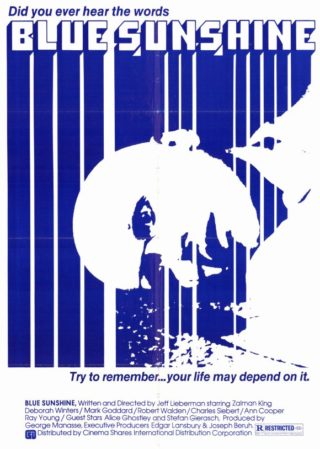 A nifty chunk of seventies-sploitation about drug users going nuts years after the fact. Just say no, indeed!
A nifty chunk of seventies-sploitation about drug users going nuts years after the fact. Just say no, indeed!
This quintessentially seventies film has an interesting anti-drug message embedded in its premise of late-60’s acidheads losing their minds a decade later (this must have made many of the film’s initial twenty-something viewers extremely nervous). The idea that the ultimate consequences of youthful experimentation may not become apparent until years later is a potent and alarming one.
Much of the story’s intended scope, which was to have included extensive flashbacks to the central characters’ college days, was lost to a low budget, but this remains one of the key drug movies of the 60’s-70’s, joining such luminaries as THE TRIP, PSYCH-OUT and THE PANIC IN NEEDLE PARK. In keeping with BLUE SHUNSHINE’S counterculture vibe, it’s only authority figures who go insane from the eponymous drug: a policeman, a babysitter and even a decorated politician. In one excruciating scene, it seems that a doctor is about to freak out in the midst of surgery (which turns out to be a false scare, but still…). The hero is, significantly, a longhaired punk.
Zalman King, a one-time teen heartthrob turned erotic film maestro, played this film’s hero during his brief stint as a more-or-less legitimate actor (he also appeared in cult classics like SOME CALL IT LOVING, 1973 and THE PASSOVER PLOT, 1976). Writer/director Jeff Leiberman, for his part, with BLUE SUNSHINE and the equally unique SQUIRM (1976) to his credit, appeared on track to become a major force in the genre, but subsequent efforts like JUST BEFORE DAWN (1981) and REMOTE CONTROL (1987) haven’t born out that promise.
The temperamental Jerry attends a party where one of his buddies unexpectedly flips out; the guy pushes three women into a blazing fireplace and reveals that he’s wearing a wig, under which he’s completely bald. Jerry nearly ends up in the fireplace himself, but manages to lure the man outside, where he’s unexpectedly hit by a truck and killed.
Finding himself under suspicion for the killings, Jerry becomes increasingly stressed out. He learns that similar freak-outs have recently occurred and discovers a common thread: all the perpetrators attended Stanford University around the same time in the late sixties…as did Jerry himself! All of them abused a drug called Blue Sunshine, which has LOOOOOOOOOOOOONG lasting side effects. It isn’t long before Jerry is forced to kill another ex-classmate, this time an insane babysitter who nearly stabs to death the children she’s been charged with looking after.
It all comes down to a politician who, it just so happens, dealt Blue Sunshine to his fellow college students back in the day and so is largely responsible for all the mayhem. He goes nuts in a discotheque, but Jerry manages to take him down with a stun gun in a nearby department store. The question of Jerry’s own mental state remains unresolved (it’s never revealed if he partook of the Blue Sunshine or not); furthermore, as a postscript informs us, quite a few of the original tabs of Blue Sunshine were never accounted for.
As I stated earlier, this is a very seventies film, and suffers from a number of annoying conventions popular at the time. Such conventions shine through in Lieberman’s unfortunate preferences for loose compositions and lenses that are too damn wide, and the music score often feels quite moldy (and not just in the disco club!). Lieberman is clearly a better writer than he is a director, and the potency of his screenplay luckily tends to override his shortcomings as a filmmaker. The film is also notable for its unflinching brutality and unrelenting bleakness: even during the “good” times, Lieberman seems to be saying, violence and madness are never far away.
Vital Statistics
BLUE SUNSHINE
Ellanby Films/Synapse Films
Director: Jeff Lieberman
Producer: George Manasse
Screenplay: Jeff Lieberman
Cinematography: Don Knight
Editing: Brian Smedley-Aston
Cast: Zalman King, Deborah Winters, Mark Goddard, Robert Walden, Charles Siebert, Ann Cooper, Ray Young, Alice Ghostley, Stefan Gierasch, Richard Crystal, Bill Adler, Barbara Quinn, Adriana Shaw, Bill Sorrells, Jeffrey Druce
